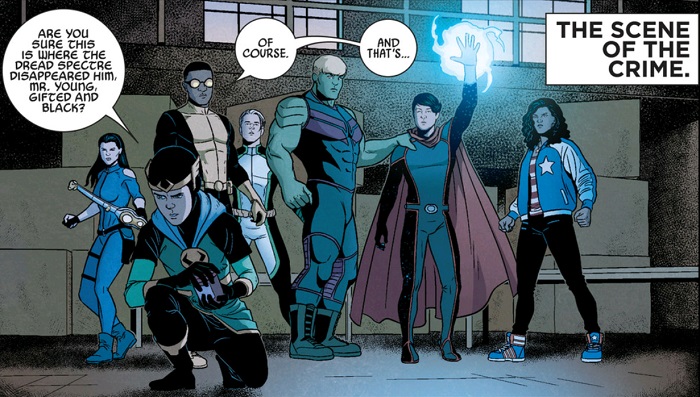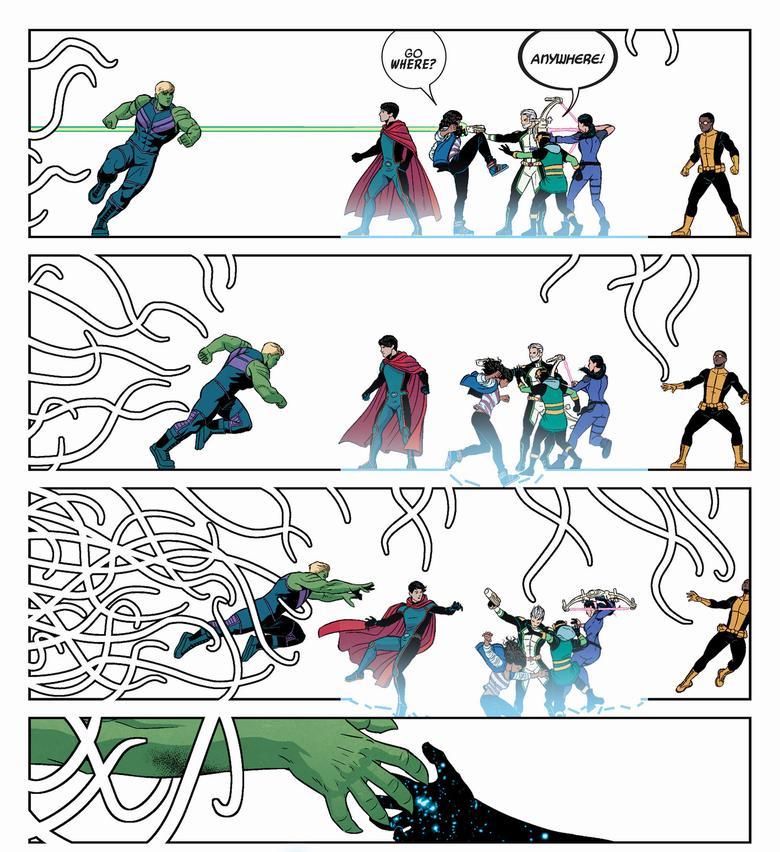I wish I could trace back how Kieron Gillen and Jamie McKelvie’s Young Avengers first came into my life. A rec from the guy who owns the comic book shop I go to? Or maybe some random entry I came across on a list of must-read comics? No matter how it appeared, reading it is one of the best comics-related decisions I’ve ever made. There is nothing I don’t love about 2013 Young Avengers. It has just about everything: amazing art, fantastic dialogue, an exciting story, engaging characters, and is practically brimming with diversity. And what makes it the perfect Pride Month topic is that the team is literally the gayest superhero team in the whole of the Big Two. Not only that, but Billy and Teddy are quite possibly the most adorable couple in Marvel. It’s like they’re made for each other (hint hint).
Origin Story
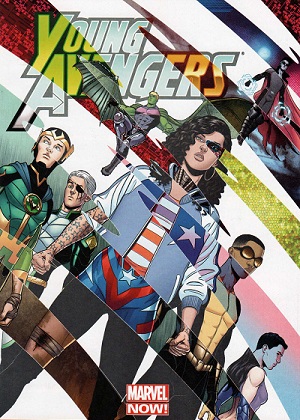 When Wiccan unintentionally lets an interdimensional parasite into his reality, the Young Avengers team up to stop her. Meanwhile, a ghost-y version of Patriot turns up and kidnaps Speed before Prodigy can stop him. Prodigy joins the team and the kids jump through space and dimensions chasing after “Patri-not” and trying to stay one step ahead of “Mother,” who wants nothing more than to suck the magical soul out of Wiccan. She sends copies of their dead parents to attack them and infects living adults as her minions, meaning the kids are only safe when they’re together. Loki has his own mischievous and selfish reasons for tagging along, but he agrees to teach Wiccan how to develop his powers. All the while, Billy and Teddy struggle with the truth behind their relationship, America keeps her secrets about her connection to Billy, Kate and Noh-Varr try out being a couple, David comes to terms with himself, and Loki must decide if he wants to be who he was or someone better.
When Wiccan unintentionally lets an interdimensional parasite into his reality, the Young Avengers team up to stop her. Meanwhile, a ghost-y version of Patriot turns up and kidnaps Speed before Prodigy can stop him. Prodigy joins the team and the kids jump through space and dimensions chasing after “Patri-not” and trying to stay one step ahead of “Mother,” who wants nothing more than to suck the magical soul out of Wiccan. She sends copies of their dead parents to attack them and infects living adults as her minions, meaning the kids are only safe when they’re together. Loki has his own mischievous and selfish reasons for tagging along, but he agrees to teach Wiccan how to develop his powers. All the while, Billy and Teddy struggle with the truth behind their relationship, America keeps her secrets about her connection to Billy, Kate and Noh-Varr try out being a couple, David comes to terms with himself, and Loki must decide if he wants to be who he was or someone better.
Kieron Gillen and Jamie McKelvie’s Young Avengers was first released in January 2013 with the new Marvel NOW! campaign. Gillen and McKelvie have produced some of the best work in the business, most recently Phonogram and The Wicked + The Divine. Young Avengers stars Wiccan (Billy Kaplan), Hulkling (Teddy Altman), Hawkeye (Kate Bishop), Kid Loki, Miss America (America Chavez), Noh-Varr (formerly Marvel Boy), and Prodigy (David Alleyne). Billy and Prodigy are mutants, the former a powerful mage and the latter lost his abilities to copy memories and skills after M-Day (see House of M). Hulkling is a half-Skrull half-Kree shapeshifter, and Noh-Varr is half-Kree half-insect who wanders around listening to vinyl and sucking at relationships. Kate shares the Hawkeye title with Clint Barton (see Matt Fraction and David Aja’s wonderful run on Hawkeye). America has super strength, can fly, and opens interdimensional portals by kicking things. Kid Loki is Loki post-resurrection (see Thor #617) and chock full of self-loathing. Also on the fringe is Speed (Tommy Shepherd), Billy’s brother with Quicksilver’s abilities, and a spirit version of Patriot (Eli Bradley).
Technically, the Gillen/McKelvie 2013 run (15 issues or 3 volumes) is Volume 2, even though Volume 1 came out in 2005 and was followed by Civil War: Young Avengers and Runaways (2006), Young Avengers Presents (2008), Secret Invasion: Runaways/Young Avengers (2008), Dark Reign: Young Avengers (2009), Siege: Young Avengers (2010), and Avengers: The Children’s Crusade (2011). Keep in mind that none of these volumes have the same team all the way through – Dark Reign has an entirely different lineup than any other series – and the stories tend to either serve as filler to tie up loose ends or launch new company-wide narratives. In other words, this column is only considering Gillen and McKelvie’s Volume 2, and so should you.
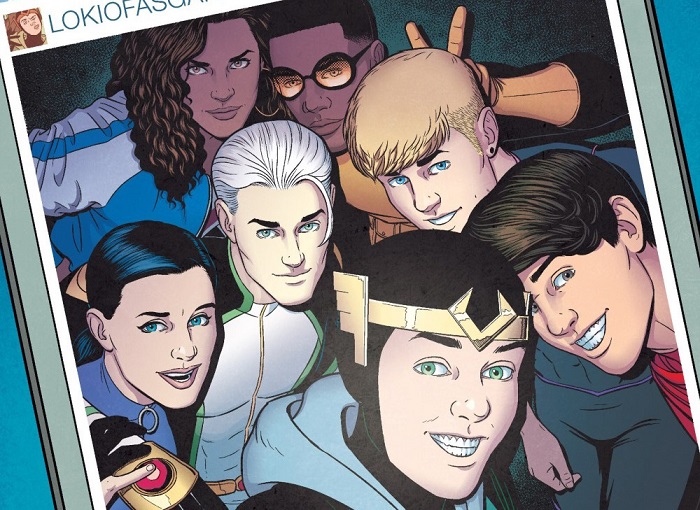
To Pull Or Not To Pull
Young Avengers works so well because it both takes its subject matter seriously and throws all rules out the window. Gillen and McKelvie don’t treat the team like a bunch of kiddies running amok without adult supervision, but like young adults figuring out on their own how to grow up. Social media, texting, and other trappings of youth culture are scattered throughout, but in a realistic fashion. The creators aren’t mocking the kids for their reliance on social technologies, nor do they have the kids’ lives revolving around them. Yes, us Millennials love social media and you’d be hard pressed to get me to put my phone down (hell, I’m writing this review on my phone on my lunch break), but it’s a feature of modern life not a bug.
These kids aren’t sidekicks, they’re genuine heroes. While Captain America and Thor laze around Avengers Mansion, the Young Avengers are out there kicking ass and getting their asses kicked. They let the monster into the world, and they are the only ones who can get rid of it. The trappings are tame enough for teens – an over-controlling parental unit, parents who misunderstand their progeny, feelings of insecurity, inadequacy, and insignificance, no sex, drugs, or alcohol on camera – and the deeper subjects will hit home for the new adult crowd.
Billy and Teddy are in committed, solid relationship that is less adult than Kate and Noh-Varr’s but also more mature. Kate and Noh-Varr are in their first real adult relationship, one based not just on attraction and mutual interests but sexual chemistry, a desire for stability, and trust. They aren’t looking for “the one,” but it’s serious enough to worry about birth control and heartbreak. David Alleyne undergoes a series of personal epiphanies, each revealing a hidden dimension of himself he either didn’t know was there or wasn’t ready to face. Loki has his own journey of self-discovery and the fact that he doesn’t like what he sees when he finally looks inward is a testament of how much he’s grown, not just physically but emotionally.
But it’s not all navel-gazing and romantic tension. They may be young adults, but Gillen and McKelvie balance out the responsibility of adulthood with the fun of youth. The characters are genuinely interesting to be around. I’d love to be a fly on the wall as they hang out at the Earth-212 Korean BBQ joint or explore new realities in the multiverse. Like what Matt Fraction/David Aja did with the Hawkeyes and Kelly Sue DeConnick with Captain Marvel, Gillen/McKelvie didn’t just take an old property and update it, he breathed new life into the Young Avengers. The kids are witty, charming, quirky Millennials, but go beyond the hipster trope. They’ve experienced too much to be flighty and dismissive, but aren’t worn down enough to be hardened and disillusioned.
Their complexity as people is perfectly illustrated by McKelvie. He has this way of drawing expressions where the character could mean a hundred different things depending on the context of the line and attitude of the reader. It works like magic with Loki, the god of misdirection and misinformation, with how America plays everything close to the chest, with Kate and Noh-Varr who aren’t yet ready to say what they mean, and with Billy, Teddy, and David who don’t know what they really want in the first place. And don’t even get me started on how McKelvie breaks down the comic book and shifts the pieces around to push the medium to stunning results.
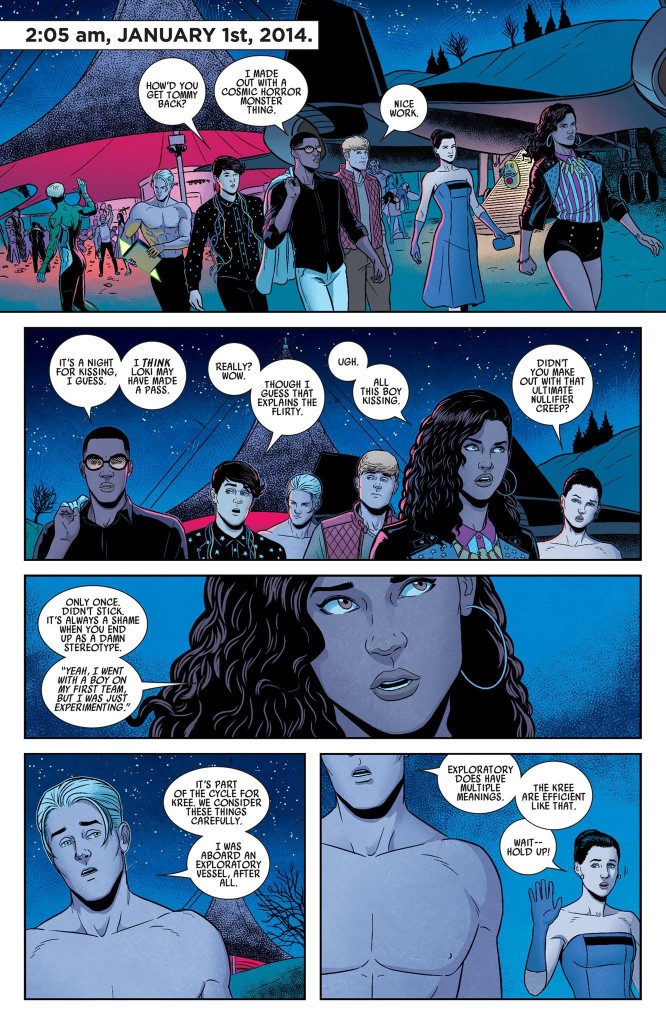 Of course, we can’t end this review without talking about the gay issues in Young Avengers. Not only are all the characters on the LGBTQ spectrum, but America’s parents are revealed to be lesbians. There’s no gay angst or homophobia to be found, and only one coming out story. America is a lesbian, Billy and Teddy gay, David bisexual, Noh-Varr experimental, and Kate might not be as straight as she thinks she is. But no matter what, being LGBTQ is just a part of who they are, never the defining feature.
Of course, we can’t end this review without talking about the gay issues in Young Avengers. Not only are all the characters on the LGBTQ spectrum, but America’s parents are revealed to be lesbians. There’s no gay angst or homophobia to be found, and only one coming out story. America is a lesbian, Billy and Teddy gay, David bisexual, Noh-Varr experimental, and Kate might not be as straight as she thinks she is. But no matter what, being LGBTQ is just a part of who they are, never the defining feature.
Billy and Teddy’s tumultuous relationship isn’t interesting because it involves two men, it’s interesting because we are invested in the success of relationship between two people we care about. America isn’t who she is because she and her mothers were lesbians, but because she looked into the universe and its creator looked back. David had a hard life, first as a mutant with powers that could easy screw with even the sturdiest person, then suddenly losing everything that made him special and unique, then finding himself on the wrong side of a losing battle, then stuck in a dead end job with no friends and no life. Opening up about his bisexuality is the first time he’s been honest with himself the whole series, and it’s played not as a plot device so much as a crucial step on David’s path of personal growth leading to a bigger moment in the final issue.
Between Gillen and McKelvie, the characters in Young Avengers leap off the page as fully-fledged, interactive beings, in some cases almost literally. They’ve forever ruined all other Young Avenger series. I was once so desperate for more adventures with Hawkeye, Hulkling, Wiccan, Noh-Varr, Speed, Prodigy, and Miss America that I picked up The Children’s Crusade. That was a mistake I will never make again. No other run could reach the great heights of Gillen and McKelvie’s. There’s a reason I recommend Young Avengers to just about everyone. It’s that good. Really.
Alex Brown is an archivist, research librarian, writer, geeknerdloserweirdo, and all-around pop culture obsessive who watches entirely too much TV. Keep up with her every move on Twitter and Instagram, or get lost in the rabbit warren of ships and fandoms on her Tumblr.










